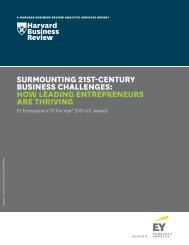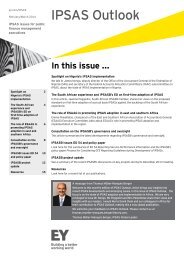Create successful ePaper yourself
Turn your PDF publications into a flip-book with our unique Google optimized e-Paper software.
Africa 2030: Points of viewAfrica will rise, but the rise will be neither linear nor guaranteedColin ColemanColin Coleman is Managing Director, Head of the South African Office and Investment BankingDivision, Sub-Saharan Africa, for Goldman Sachs, the leading global investment banking, securitiesand investment management firm.I am a believer in the long term rise of Africa, but am of the opinionthat it will be neither linear nor guaranteed. There are somedangers in overstating the ‘Africa rising’ view; not the least ofthese reasons is because it is simply a one-dimensional mirrorimageof the old, outdated view on Africa. The reality of Africa is farmore complex than either of these extremes. As we all know, it isan incredibly diverse continent, with many different trajectories indifferent countries.Having said that, Africa’s future is likely to depend on the successof a handful of key economies, most notably, South Africa, Nigeriaand Kenya. Each of these economies has great potential, but alsofaces significant challenges. Nigeria and Kenya offer interestinggrowth prospects, supported by demographics, natural resources,as well as the growing interest of foreign investors from variousparts of the world. However, systemic corruption remains a veryreal challenge. The terrorist threat posed by Boko Haram and AlShabaab, however, means that long-term peace and stability in bothEast and West Africa is not guaranteed.South Africa is obviously a somewhat different proposition interms of the country’s business and financial infrastructure: itssophisticated capital market and depth of capital and managementcapability, sets it apart from other economies on the continent.However, public sector service delivery failures and endemiccorruption are key factors holding the country back.In the case of all three countries, leadership from both the publicand private sectors will be a key determinant in whether we areable to overcome these challenges and realise Africa’s potential.From governments, we require competent, professional, capableadministrators that can execute on policy. In most instances, thepolicy we have is fine; it does not require revision or fine-tuning,it requires execution. We require governments that focus on theirbasic functionality, implementing policy, strengthening publicinstitutions, entrenching rule of law, building roads, power plants,schools and hospitals. Ultimately, we need political leaders who aretrue democrats, but are able to focus on longer-term growth andprosperity, rather than short-term personal gain.Business also clearly has a role to play in providing leadership. But,we need to be clear on the line between the job of government andthe job of business. Business can be a real force for good in Africa,and long-term growth and development will be largely dependenton a productive partnership between business and government.However, business leaders clearly require social intelligence interms of the environment in which they operate. We need tounderstand that we cannot be here simply to make a profit; thesocio-economic dynamics in Africa are such that we must alsoconsciously seek to maximise the broader benefits our activities cancreate for local economies and communities. This opportunity forgrowth, as well as making a significant contribution, is one of thethings that make Africa such an exciting place.Despite the challenges we face, there is good reason for optimism.In a best case scenario, and assuming active leadership from, andcollaboration across the public and private sectors, South Africa’seconomy will reach the US$ 1 trillion mark by 2030. Nigeria’seconomy will be double that size; approximately the size of theentire continent’s economy today. Kenya will be at the centre ofa functioning East African common market, in which oil and gasreserves are being responsibly exploited, with resource revenuesbeing reinvested in infrastructure and public welfare. Angola willhave emerged as another growth engine for the continent, havingreformed its political system, invested significantly in infrastructure,and made strides towards diversifying its economy. Overallthese and other African economies will have seen the rise of anentrepreneurial class, the spread of wealth away from political elitesto an evolved middle class, and progress towards far more inclusivesocieties.This future for Africa is entirely plausible, but it is not guaranteed,and will depend on reaching the high road outcome in the key hubeconomies. For us, navigating through the dynamics in Africa is anexciting opportunity in a world beset with challenging dynamics.In our business, we are seeing a dynamic cycle of development,investment, M&A and capital raising only beginning to take off.As we move forward our opportunity is to build a substantial anddiversified Africa-wide portfolio across different markets, productsand revenue streams.The question we are often asked though is;’ When is the right timeto invest?’ There are clearly opportunities in Africa today, but Iforesee the real opportunity only peaking in 10-15 years. It is achicken and egg dilemma, but for us, if we were not already on ourAfrican growth journey, we do not believe we will be in a position toreap the rewards in the future.40





